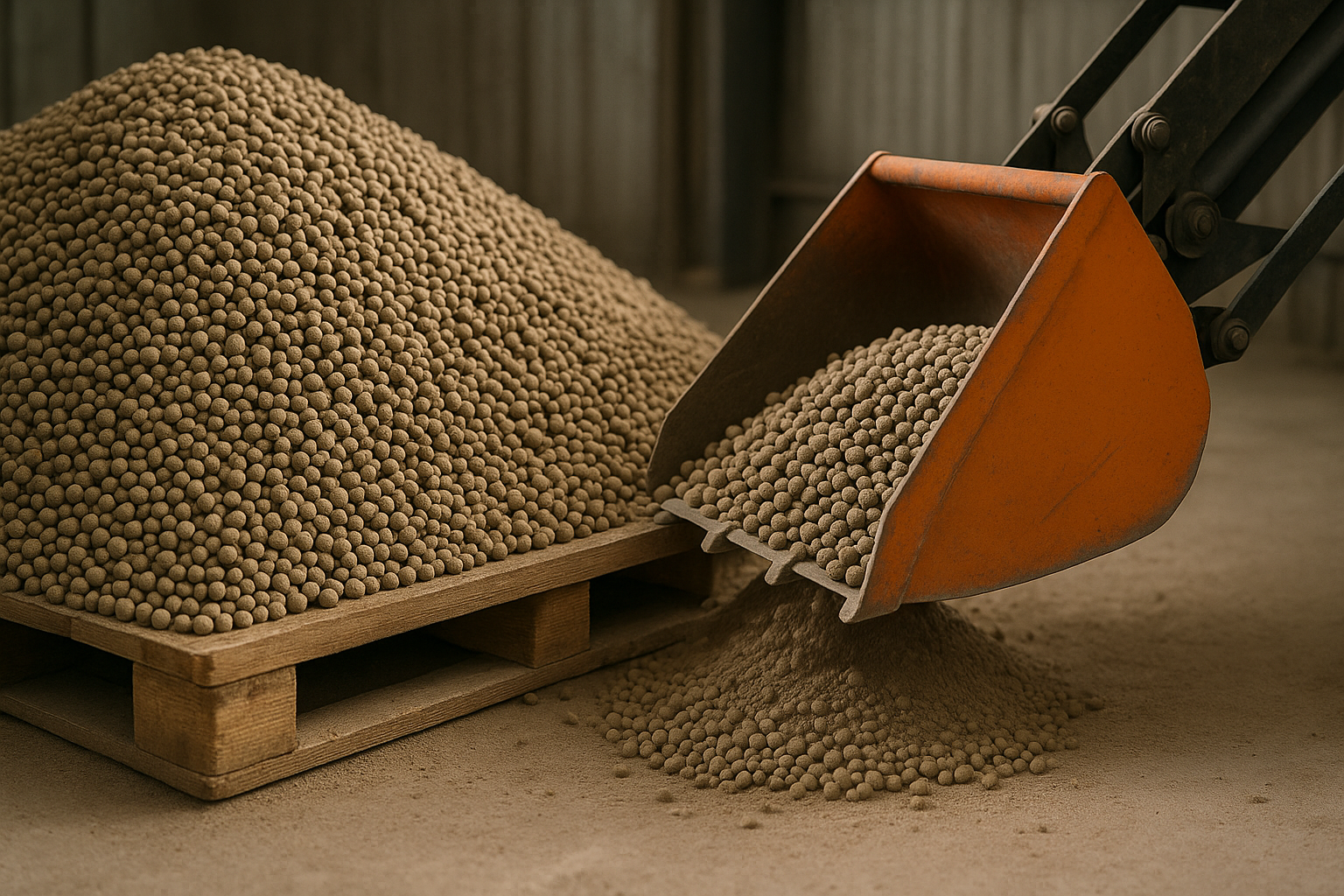Did you know that India is the third-largest producer of bentonite globally, accounting for a significant share of the world’s bentonite production? In 2018, China was the top producer of bentonite, with almost a one-quarter share of the world’s production, followed by the United States and India. Among the various forms of bentonite available in the market, bentonite pellets have emerged as a versatile and efficient solution for numerous industrial applications across India.
As industries continue to evolve and demand more efficient materials, understanding the properties and applications of bentonite pellets becomes crucial for manufacturers, contractors, and industrial professionals. This comprehensive guide will explore what bentonite pellets are, their unique characteristics, and their wide-ranging applications in the Indian industrial landscape.
Understanding Bentonite Pellets: The Fundamentals
What Are Bentonite Pellets?
Bentonite pellets are compressed, granular forms of bentonite clay that have been processed into small, uniform spheres or cylindrical shapes. Unlike traditional bentonite powder, these pellets offer enhanced handling properties, controlled release characteristics, and improved application efficiency.
Bentonite pellets are renowned for their consistency, performance, and reliability, making them the preferred choice for professionals across industries. The pelletised form provides several advantages over conventional powdered bentonite, including reduced dust generation, easier transportation, and more controlled application rates.
Composition and Properties
Bentonite pellets primarily consist of sodium montmorillonite clay, which gives them their exceptional swelling properties. When exposed to water, these pellets can absorb several times their dry weight, creating a gel-like substance that forms an effective barrier or suspension medium.
Key properties of bentonite pellets include:
- High water absorption capacity
- Excellent swelling characteristics
- Superior sealing properties
- Chemical stability
- Non-toxic nature
- Controlled release mechanism
Industrial Applications of Bentonite Pellets in India
Drilling Mud Applications
The most common use of bentonite is in drilling fluids. The bentonite in the flush fluid lubricates and cools the cutting tools while protecting against corrosion. In India’s expanding oil and gas sector, bentonite pellets play a crucial role in drilling operations. Leading oil drilling bentonite manufacturers & exporters in India are meeting the growing demand with high-quality, performance-driven bentonite products tailored for efficient and safe drilling processes.
The drilling mud made from bentonite pellets offers several advantages:
- Enhanced borehole stability
- Improved hole-cleaning capacity
- Effective filtration control
- Reduced formation damage
- Better suspension properties
The drilling mud made of sodium bentonite has the advantages of high pulping rate and so on. This makes bentonite pellets particularly valuable for India’s diverse geological conditions, from offshore drilling in the Arabian Sea to onshore operations across various states.
Foundry Applications
India’s foundry industry, which is among the largest globally, extensively uses bentonite pellets as binding agents in moulding sand. The pellets provide excellent green strength, allowing for the creation of precise moulds that can withstand the high temperatures of metal casting.
Benefits in foundry applications include:
- Superior binding strength
- Improved dimensional accuracy
- Better surface finish on castings
- Reduced defects in final products
- Cost-effective moulding solutions
Iron Ore Pelletisation
Sodium Bentonite is used in foundry, pilling, steel pellets plants, wine products, ceramic industries, and others. In India’s steel industry, bentonite pellets serve as binding agents in the pelletisation of iron ore fines, creating stronger and more durable pellets for blast furnace operations.
The pelletisation process benefits from bentonite pellets through:
- Enhanced green ball strength
- Improved thermal stability
- Better reducibility of iron ore pellets
- Reduced dust formation
- Optimal porosity for gas flow
Construction and Civil Engineering
Bentonite pellets provides a better sealing property and is free from any toxic material hence also safe to use in aquif [aquifer applications]. In India’s rapidly growing construction sector, bentonite pellets are used for:
- Waterproofing basement walls
- Sealing foundation cracks
- Creating impermeable barriers
- Tunnelling support systems
- Horizontal directional drilling (HDD)
Environmental Applications
With India’s increasing focus on environmental protection, bentonite pellets find applications in:
- Groundwater remediation
- Waste containment systems
- Soil stabilisation projects
- Water treatment facilities
- Environmental restoration programs
Advantages of Using Bentonite Pellets
Enhanced Handling and Application
Traditional bentonite powder can be challenging to handle due to dust generation and inconsistent flow properties. Bentonite pellets address these issues by providing:
- Dust-free handling
- Consistent flow characteristics
- Easier metering and application
- Reduced product loss during transportation
- Better storage stability
Controlled Release Properties
The pelletised form allows for controlled hydration and release of the bentonite, ensuring optimal performance in various applications. This controlled release mechanism is particularly beneficial in:
- Drilling operations where gradual hydration is required
- Construction applications needing timed sealing
- Environmental remediation projects
- Long-term containment systems
Economic Benefits
From a cost perspective, bentonite pellets offer several advantages:
- Reduced material waste
- Lower transportation costs
- Improved application efficiency
- Reduced labour requirements
- Better inventory management
Quality Standards and Specifications
In India, bentonite pellets must meet specific quality standards to ensure optimal performance across different applications. Key specifications include:
- Swelling index
- Moisture content
- Particle size distribution
- Chemical composition
- Compressive strength
Companies like CMS Industries, with their ISO 9001:2015 certification, ensure that their bentonite products meet international quality standards whilst being specifically tailored for Indian market requirements.
Selection Criteria for Bentonite Pellets
When choosing bentonite pellets for industrial applications, consider the following factors:
Application-Specific Requirements
Different applications require specific properties:
- Drilling operations need high-yield bentonite with excellent suspension properties
- Foundry applications require strong binding characteristics
- Construction projects need controlled swelling properties
- Environmental applications demand chemical stability
Quality Assurance
Look for suppliers who provide:
- Consistent quality control measures
- Comprehensive testing protocols
- Certification from recognised bodies
- Technical support and guidance
Supply Chain Reliability
Consider suppliers with:
- Strategic manufacturing locations
- Adequate production capacity
- Reliable logistics networks
- Proven track record in the industry
Future Trends and Innovations
Technological Advancements
The bentonite pellet industry in India is witnessing several technological improvements:
- Enhanced pelletisation techniques
- Improved coating technologies
- Better quality control systems
- Automated production processes
Market Expansion
At present, bentonite has been used in more than 20 fields in India. This diversification is expected to continue, with new applications emerging in:
- Renewable energy projects
- Advanced manufacturing processes
- Biotechnology applications
- Nanotechnology research
Sustainability Focus
With India’s commitment to sustainable development, there’s an increasing emphasis on:
- Environmentally friendly production methods
- Reduced carbon footprint
- Sustainable mining practices
- Circular economy principles
Best Practices for Using Bentonite Pellets
Storage and Handling
Proper storage is crucial for maintaining the quality of bentonite pellets:
- Store in dry, covered areas
- Protect from moisture and contamination
- Use appropriate handling equipment
- Follow safety protocols
Application Guidelines
For optimal performance:
- Follow manufacturer’s recommendations
- Conduct pre-application testing
- Monitor application rates
- Ensure proper mixing procedures
Quality Control
Implement regular quality checks:
- Test incoming materials
- Monitor application performance
- Document results for future reference
- Maintain traceability records
Conclusion
Bentonite pellets represent a significant advancement in the utilisation of bentonite clay for industrial applications. Their unique properties, including controlled release characteristics, enhanced handling capabilities, and superior performance, make them an ideal choice for various industries across India.
As India continues to develop its industrial infrastructure and expand its manufacturing capabilities, the demand for high-quality bentonite pellets is expected to grow significantly. Understanding their properties, applications, and benefits will help industries make informed decisions and optimise their operational efficiency.
Whether you’re involved in drilling operations, foundry work, construction projects, or environmental remediation, bentonite pellets offer a reliable and cost-effective solution. By choosing the right supplier and following best practices, you can harness the full potential of this versatile material.
For more information about high-quality bentonite pellets and other bentonite products, visit CMS Industries – your trusted partner for premium bentonite solutions in India.
Frequently Asked Questions (FAQs)
1. What is the difference between bentonite pellets and bentonite powder?
Bentonite pellets are compressed, granular forms of bentonite clay that offer dust-free handling, controlled release properties, and easier application compared to traditional bentonite powder, which can be dusty and difficult to handle.
2. Which industries commonly use bentonite pellets in India?
Major industries include oil and gas drilling, foundries, steel plants, construction, civil engineering, and environmental remediation. The versatility of bentonite pellets makes them suitable for over 20 different industrial applications.
3. How do bentonite pellets work in drilling applications?
Bentonite pellets hydrate gradually when mixed with water, forming a drilling mud that lubricates cutting tools, stabilises boreholes, removes cuttings, and prevents formation damage during drilling operations.
4. What are the quality standards for bentonite pellets in India?
Quality standards include swelling index, moisture content, particle size distribution, chemical composition, and compressive strength. ISO 9001:2015 certified manufacturers ensure consistent quality and international standards compliance.
5. How should bentonite pellets be stored and handled?
Store in dry, covered areas protected from moisture and contamination. Use appropriate handling equipment to prevent damage, follow safety protocols, and maintain proper inventory rotation to ensure optimal product performance.







